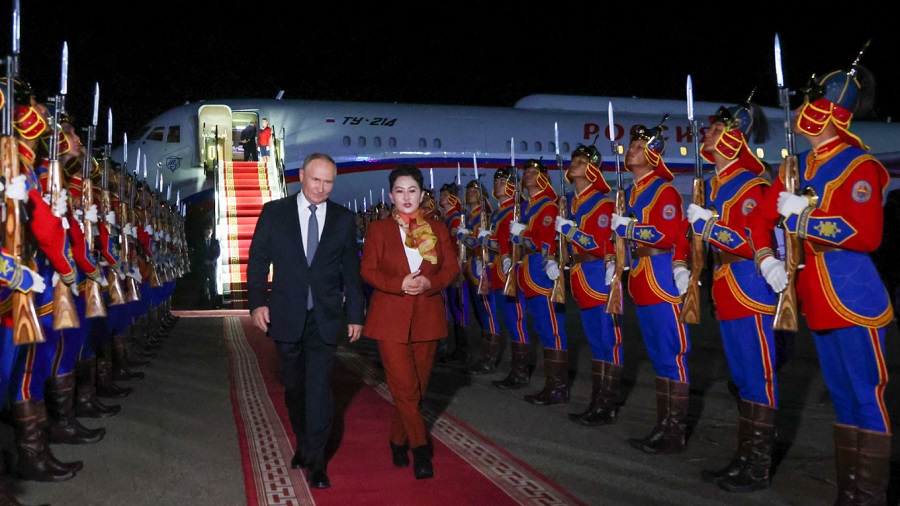Russian President Vladimir Putin’s visit to Mongolia marks his first trip to an International Criminal Court (ICC) member state since the ICC issued a warrant for his arrest in March 2023 over the illegal deportation of Ukrainian children to Russia.
While the visit showcases Putin’s defiance of the West, it also raises significant questions about international law and Mongolia’s adherence to the ICC’s Rome Statute, according to experts.
Kremlin spokesman Dmitry Peskov reassured reporters before the trip that Moscow had “no concerns” about Mongolian authorities refusing entry or arresting Putin, stating that “all aspects of the visit were thoroughly prepared.”
Sergey Vasiliev, an international law expert at the Netherlands-based Open Universiteit, explained that “under customary international law, heads of state, government, and foreign ministers enjoy personal immunity in foreign courts.” However, he added, “the ICC’s statute and jurisprudence do not recognize such immunities.”
Vasiliev emphasized that, as an ICC member, Mongolia is “obligated to execute” the arrest warrant for Putin. Failing to do so, he noted, would “cast doubt on its compliance with the obligations under Articles 86-87 of the Rome Statute,” which Mongolia ratified in 2002.
Putin’s official reason for visiting Mongolia is to commemorate the 1939 Soviet-Mongolian victory over Japan in the Battle of Khalkhin Gol. His visit is expected to be brief, with only a few meetings in the capital, Ulaanbaatar.
Despite the short duration, analysts agree that Mongolia’s reluctance to fulfill its Rome Statute obligations will bolster Putin’s image as a strong and untouchable leader, undeterred by Western attempts to isolate him.
Vasiliev pointed out that beyond the symbolic defiance, Putin could also use the visit to “drive a wedge” between Western ICC members and countries in the Global South regarding support for accountability for international crimes in Ukraine and elsewhere.
“Putin’s propaganda will likely exploit Mongolia’s failure to arrest him, portraying the warrant as nothing more than Western lawfare and asserting that the ICC prosecutor and judges were acting on behalf of the West,” Vasiliev told The Moscow Times.
He warned that this could encourage similar behavior from other ICC member states who are undecided on supporting Ukraine and might prefer to maintain business ties with Russia.
Ukraine’s Foreign Ministry, along with Human Rights Watch and several Russian opposition figures, called on Mongolia to honor its international law obligations. At least two joint letters were sent to the Mongolian government on Monday urging action.
“There is widespread disappointment because Mongolia is often seen as part of the democratic club of nations,” said Ivan Kłyszcz, an expert at the International Center for Defense and Security in Estonia. “But Mongolia’s relationship with Russia is unique due to Cold War and imperial legacies, which limits what they can do.”
Last year, Putin was forced to skip the BRICS summit in ICC member South Africa after the South African government failed to guarantee his safety from arrest.
For Mongolia, however, the benefits of maintaining a stable relationship with Russia may outweigh the potential repercussions of being criticized by the ICC.
While the U.S. Embassy in Ulaanbaatar warned of possible anti-Putin protests, and a small group of demonstrators gathered in the capital ahead of Putin’s arrival, experts believe that, unlike in South Africa, public pressure is unlikely to influence Mongolia’s stance.
Putin is not the first leader with an active ICC arrest warrant to visit an ICC member state.
I am an experienced writer, analyst, and author. My exposure in English journalism spans more than 28 years. In the past, I have been working with daily The Muslim (Lahore Bureau), daily Business Recorder (Lahore/Islamabad Bureaus), Daily Times, Islamabad, daily The Nation (Lahore and Karachi). With daily The Nation, I have served as Resident Editor, Karachi. Since 2009, I have been working as a Freelance Writer/Editor for American organizations.










